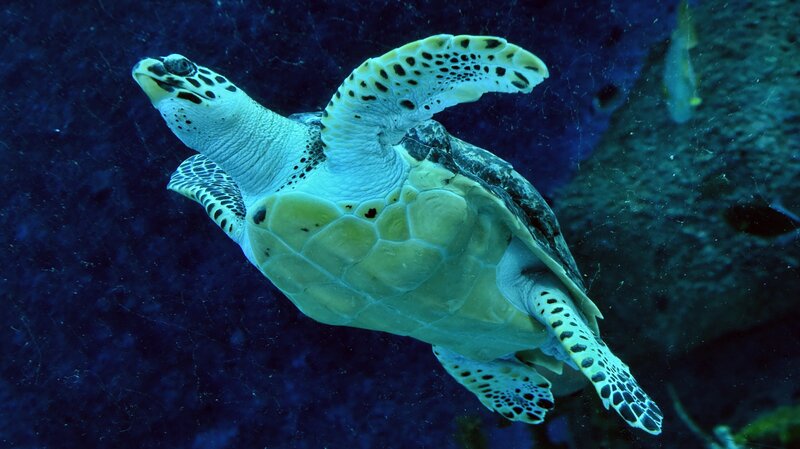 |
| A hawksbill turtle in a Singapore aquarium |
A recent U.N report published by scientists and researchers has pointed out that up to 1 million plant and animal species are in danger of extinction - many of them in decades. The emphasis of this report focuses on how humankind's sprouting growth is putting the world's biodiversity at hazardous risk. Some of the report's data is not new to those who have followed news of how humans have disturbed the environment, from changes in seasons to the predominance of plastics and other contaminants in water. However, the authors of the report indicated that the evaluation is the most precise and thorough review yet of the devastation human beings are imposing on the planet. And they cautioned that nature is deteriorating at "unprecedented" proportions and that the changes will put people at risk. According to Sir Robert Watson, chair of the Intergovernmental Science-Policy Platform on Biodiversity and Ecosystem Services (IPBES), the report paints "an ominous picture." He further stressed that business and financial concerns are at risk of diminishing, in addition to the health of the world's ecosystems which people and other species depend on. The report listed several major global threats, from humans' use of land and sea resources to threats presented by climate change, pollution, and invasive species. In its record of humankind's damage on the Earth, the evaluation stated that "approximately 60 billion tons of renewable and nonrenewable resources are now extracted globally every year," and further added that the figure has practically increased since 1980. One of the authors, Sandra Diaz of Argentina, and other experts described human beings as both the cause of the threat and the target of its perils. They indicated that as humankind calls for more food, energy, housing and other resources, it is also weakening its own food security and long-term possibilities. The report even found patterns of "telecoupling," which Eduardo S. Brondizio of Brazil and U.S, described as the phenomenon of resources being obtained and made into goods in one part of the world "to satisfy the needs of distant consumers in other regions." He further added that the pattern makes it more difficult to avoid damage to nature through the normal routes of accountability and governance. While the report's statistics about what the world stands to lose due to human activity are attracting headlines, conservation advocates stated that they hope the evaluation will help people understand the bigger picture. Among them is Collin O'Mara, president and CEO of the National Wildlife Federation (NWF), who stated that the report could help people "see that this is a systematic threat could potentially cause the sixth extinction, even if we don't act quickly."
 |
| Plastic pollution in Ghana |
I strongly believe that the information and statistics shown in this U.N report should be greatly considered by the global community. This report is the work of hundreds of experts creating the international assessment, with 455 authors representing 50 countries who took part. Its findings are based on reviews of around 15,000 scientific and government sources and also includes awareness from indigenous and local communities. The report's authors stated that the goal of their work was not just to investigate a worsening circumstance but to give policymakers "the tools they need to make better choices for people and nature." I highly urge policymakers in the U.S and around the world to strongly consider this report if they want to benefit their people and their well-being. Human beings are responsible for the deterioration of nation and in turn, they are inadvertently the victims of the risks caused by the ongoing exploitation of the world's resources. This has got to change! Up to 1 million species of plants and animals are in the danger of extinction as a result of a wide-range of anthropogenic factors and it is up to us as a global community to take necessary steps to save them from extinction.
View article and report here
No comments:
Post a Comment